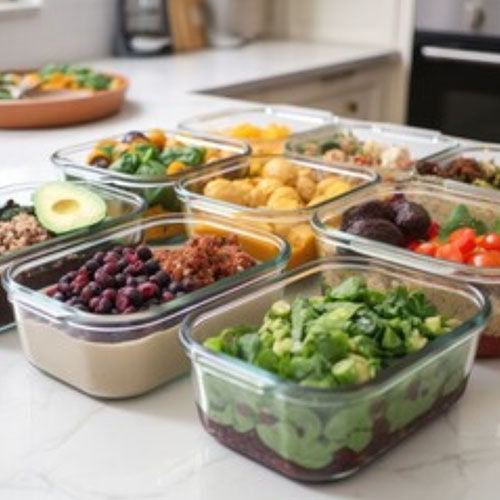The Ultimate Guide To Meal Prep
The Ultimate Guide To Meal Prep
Meal Prep and food organisation plays a pivotal role when creating better food habits/ choices and sets you up with overall preparation of your weekly meals, individuals often get daunted about the time it will take it prepare food. Really Be it quite simple and easy, having ready made available meals will prevent, unrationed decisions to order uber eats or picking up maccas after a long day of work. Often most of us can relate to this cycle. But no to worry change takes time and bad habits die hard but with the right tools in place making these changes can be a breeze. We’ll take you through a step-by-step process in organising and creating a basic structure when it comes to meal planning and preparation. Teaching you about time management, meal breakdowns, food storage, and cooking techniques. Hopefully this guide can help you with a smooth and easy transition into starting your journey to developing healthier eating habits and guide you to overall better health!
Step 1: Creating a habit and setting aside time.
First and foremost: Getting yourself into a regular rhythm and routine is probably the biggest attribute you must develop when starting meal prep. Ways to work around a busy lifestyle are to:
- Set aside 1-2 days a week which you allocate for your cooking days (most people find it best to kick the week off by meal prepping on Sundays. If you are someone who likes their food more freshly cooked, you can opt to have a Sunday/ Wednesday option.
- Creating the routine: a good tip is to organise the time you start meal prep at the same time each week, eg – 11am Sunday morning. Another useful tool is to link in your meal prep with a regular daily activity such as pre or post shower, upon rising or before going to bed, straight after you brush your teeth, or add it in to when you’re watching TV etc. You are more likely to make it a habit if you link it in with regular/routine daily activities. Think of this as utilising your time economically, or associate food prep with an activity you enjoy doing.
- Set up a daily calendar with a structured routine and include a list of activities you must complete throughout the day. Set aside time to allow for your meal prep within this structure so you know exactly what is in store for your day.
- Finally, set aside roughly 1 – 2 hours for your meal preps (depending on what you are cooking it can take more or less). Cook all meals together I’ll show you further into this guide how to divide into portions for storage.
Step 2: How to organise your food for prep.
People often get confused on how to organise their food while meal prepping. I’ve found that the best and most effective way to organise your food is to:
Here’s how to prep to cook multiple meals at once so you can freeze them for later:
Calculate the amount of each food together in bulk for the number of days you want to cook for. Eg: 3 days’ worth of 150g chicken x 2 meals daily = 300g per day. So, for the 3 days you would need a total of 900g of chicken. This would then be cooked whichever way you choose and separated into 6 portions after cooking (these do not have to be exact measurements – just go by eye). This method can be used for any number of days / times / meals you need. If you’re going by food weight, weigh the amounts of proteins and carbs prior to cooking so you have the correct amount of food cooked and ready to divide up.
Once you have everything weighed, set up your pots and pans to cook up everything all at once. This is why it is recommended to keep your meal plan as simple as possible – avoiding meal prep complications will help you stay on track by keeping it as simple as possible.
Using the method outlined above keeps you with a stock of meals to select from when you need them, especially if you make more than one type of meal at a time. Eg: make a chicken dish x multiple servings and make a beef/lamb dish x multiple serving. If you allocate one day a week for your cooking, and freeze your portions, you can have alternating meals throughout the week, so you don’t get bored!
If you enjoy more variety than that, and have been provided with menu options, you can still meal prep according to the methods outlined above, even making more than two types of meal.
Keeping your meal plan basic each week is most beneficial as it creates less stress and takes less time to prepare. If your plan gets too complicated, there is more chance you will deviate, as it will get “too hard”. Try and stick out each menu for a week and I will adjust/ rotate foods for variety during/after our weekly check INS!
Another option is to cook fresh each day. You can even prepare ahead for this, here’s how:
- Cut up all food in bulk (enough for a few days at least). For example: a big batch of pre-cooked rice, plus your daily chicken/beef allowance x however many days. From there, refrigerate. It will easily keep for three days.
- When it comes to the meal you want to cook for the day pull out the raw ingredients (meat) and the rice (pre-cooked in a batch) and weigh each according to how much is needed for your meal. So, out of the batch of rice, take 100g (or your allowance) from it and likewise with the meat. Remember meat shrinks 25% in weight when cooked. Throw it in your pot or pan and cook it with whatever herbs and spices you are feeling for the day. Heat the rice in the microwave as it’s already cooked, or put it in with your meat and veg to cook.
- Repeat this process for all meals.
Step 3: Storage
Once you have cooked up all your foods, separate them according to number of meals you have cooked for. EG: if you have 150g chicken and 50g rice per meal, place this quantity into individual containers (1 per meal) Kmart and Big W have a great range of single meal sized containers that you can wash up after each meal – saving the environment!
- Label each container with the day you intend to eat it and what the meal is inside the container.
- Store in the fridge for no longer than 3 days if it is a white meat and no longer than 5 days if it is a red meat. (If you are cooking for the whole week (7 days) we suggest you place the remaining meals/containers in the freezer and defrost when you need it during the week).


